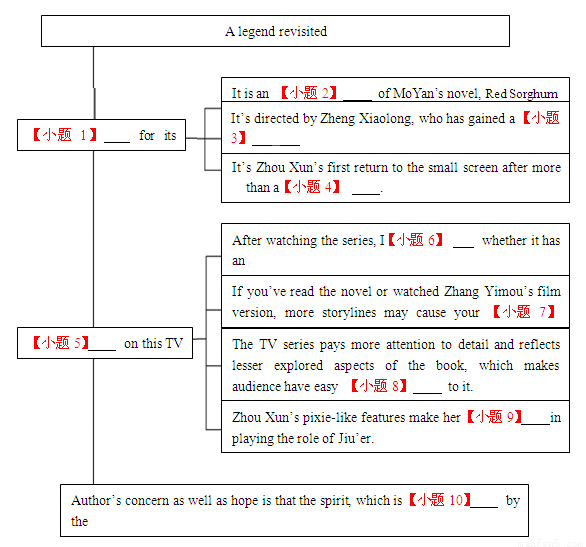题目内容
Apparently, the most talked about TV series in China right now is Red Sorghum(红高粱), currently broadcasting on four major networks. And here are a few reasons why you might want to tune in: 1) It’s adapted from the novel Red Sorghum Clan by Nobel Prize-winning author Mo Yan, which already had a renowned film adaptation in 1987; 2) it’s directed by Zheng Xiaolong, best known for helming Legend of Zhen Huan; 3) and it’s Zhou Xun’s first return to the small screen after more than ten years.
After watching almost one third of the whole series, I’m pretty sure the series doesn’t disappoint — and sometimes it’s even better than I expected. But can it have an enduring impact like the Legend of Zhen Huan, or even its film version? I’m a little skeptical.
It’s the same story of the unrest of rural China in the late 1920s and 30s. But if you’ve read the novel or watched Zhang Yimou’s film version, it’s easy to get confused early in the show. There’re quite a few newly added characters, such as Jiu’er’s first love and sister-in-law, and more storylines that you’re just not familiar with.
This doesn’t mean it’s a bad adaptation, though. Whereas the film focuses more on social and political dynamics to reflect the spirit of the novel, the TV series pays more attention to detail and reflects lesser explored aspects of the book. To some extent, it has no choice — a TV series requires more substance to fill in long hours with content. Meanwhile, it’s more accessible to a television audience.
The biggest surprise in Red Sorghum is undoubtedly Zhou Xun. Although she’s mostly known for making movies, Zhou has portrayed a couple of classic TV characters, such as Huang Rong and the young Princess Taiping. Obviously, her elegant pixie-like(古灵精怪的) features haven’t kept her from playing the role of the 19-year-old Jiu’er successfully. Not as natural as Gong Li’s portrayal, though, Zhou certainly delivers a powerful new voice through the character.
Mo’s novel conveys a strong and evocative tone. My concern, also my hope, is that the symbolism of red sorghum, the metaphor for change and loss in a particular time and place, can shine through.

1.Reasons
2.adaptation/adaption
3.reputation
4.decade
5.Comments/Remarks
6.doubt/suspect
7.confusion/puzzlement
8.access
9.succeed/successful
10.symbolized/symbolised
【解析】
试题分析:本文主要讲述了最近热播的电视剧《红高粱》。文章说明《红高粱》之所以如此受关注有它是由诺比尔文学奖的获得者莫言的小说《红高粱》改编而成,是由热播剧《甄嬛传》的导演郑晓龙拍摄的,同时也是周迅十年之后,再次回归电视。电视剧《红高粱》播出开始,观众评价很高,但是,是否能够延续《甄嬛传》的奇迹以及电影版的影响,作者保持怀疑。电视版的《红高粱》在某些人物和剧情上面有些改变,相比于电影版更加注重从社会和政治的动力因素来反映小说的精神主旨,电视剧《红高粱》较注重细节和原小说中没有挖掘的方面,同时周迅生动的表演同时也是电视剧《红高粱》最大的惊喜。
1.
2.
3.
4.
5.
6.
7.
8.
9.
10.
意思是:我的担心,也是我的希望,是红高粱的象征,在一个特殊的时间和地区,改变和失去的寓意,可以闪光。故填symbolized/symbolised
考点:考查说明文阅读

 云南师大附小一线名师提优作业系列答案
云南师大附小一线名师提优作业系列答案 冲刺100分单元优化练考卷系列答案
冲刺100分单元优化练考卷系列答案假如你叫Jack,参加学校开展的“有困难向谁求助”(Who do you turn to when in trouble?)的调查活动,调查结果如下表。请用英语给校报编辑写一封信反映相关内容。
求助对象 | 比例 | 理 由 |
同学、朋友 | 58% | 年龄相仿,容易理解与交流 |
老师、家长 | 30% | 有爱心、有经验,可以信任 |
无 | 12% | 不愿与人交流,难以与人沟通 |
注意:
1.内容要点全面,并表达出你的观点。为了使文章连贯,可适当增加内容。
2.词数:120词左右。 3.文章的开头已给出。
Dear editor,
I'm a student in Senior Two. We have made a survey—“Who do you turn to when in trouble?” Here are the results
___________________________________________________________________
___________________________________________________________________
___________________________________________________________________
___________________________________________________________________
___________________________________________________________________
___________________________________________________________________
A young man went to a town and worked there. He did not have a wife and a servant did the work in his house.
The young man liked laughing a lot. He nailed the servant’s shoes to the floor on Monday, and then laughed, because he put his feet in them and fell down.
The servant was not angry, but smiled. Then the young man put brushes in his bed on Tuesday. The servant got into bed and hit the brushes with his feet. He was afraid. The young man laughed loudly again. Again the servant was not angry, but smiled.
Then on Wednesday the young man said to his servant, “You’re a nice, kind man. I am not going to be unkind to you again.”
The servant smiled and said, “And I’m not going to put any more mud from the street in your coffee.”
1.The young man went to a town ___.
A. to study
B. to work
C. to see his relative
D. to spend his holiday
2.He played a joke on the servant because ___.
A. he hated him
B. he was not satisfied with the food the servant prepared for him
C. he wanted to get pleasure
D. he liked to show off himself
3.When the young man played a joke on him, the servant was not angry but smiled because ___.
A. he liked the young man’ s action
B. making the young man laugh is his job
C. he was afraid to be fired
D. he thought he shouldn’t be angry with a child
4.What did the servant do in return to the young man?
A. He stole something from the house.
B. He gave a smile to the young man.
C. He had a fight with him.
D. He put mud into the young man’s coffee.
5.Why did the young man stop playing jokes on the servant?
A. Because the servant showed kind and nice behaviour to him
B. Because the servant told him the truth
C. Because he wanted to be a good man
D. Because his father told him to do so